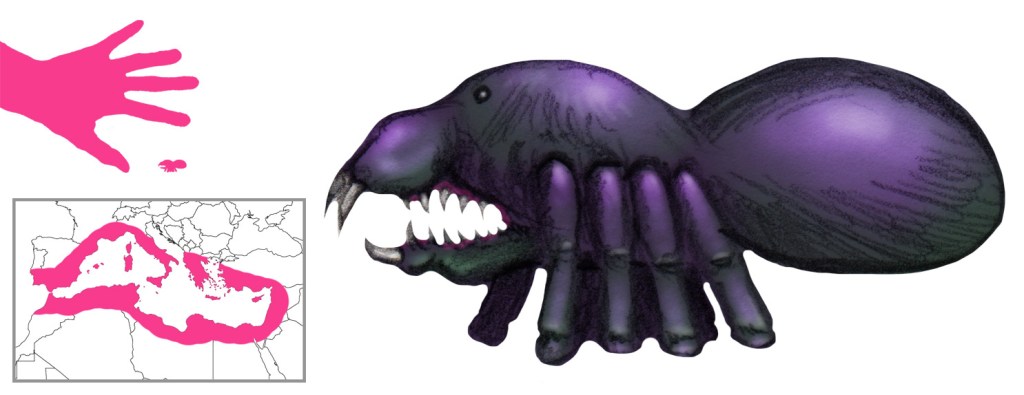Variations: Rhax, Rhagion, Rhogalida (“grape-spider”)

The name Rhox indicates similarity to a grape. It may be the same as the spider known as rhogalida or “grape-spider” on Crete, although nobody is quite sure what a rhogalida is either. Aelian places it in Libya, but it is otherwise described as a common Mediterranean spider.
In any case the rhox, as described by Nicander, Philumenus, and Pliny, is a sort of spider or phalangion. has a toothed mouth in the middle of its stomach and short, stubby legs that move in succession – a description more reminiscent of a millipede or centipede than a spider. It is smoky or pitchy black in color. Its venom is instantaneously deadly, and known symptoms include web-like strands in the urine.
The short legs may be a misinterpretation, as the description and lethality both suggest the malmignatte or Mediterranean black widow.
References
Beavis, I. C. (1988) Insects and other Invertebrates in Classical Antiquity. Alden Press, Osney Mead, Oxford.
Kitchell, K. F. (2014) Animals in the Ancient World from A to Z. Routledge, Milton Park, Abingdon, Oxon.
“Strands in the urine” sounds terrifying.
LikeLiked by 1 person
Web-like strands. In urine? Oh, oh god!
LikeLiked by 1 person
Pee of spider’s web from spider bite? Sounds like some sort of bad parody of spiderman
LikeLiked by 1 person
If the venom is instantaneously deadly, how do the victims have time to provide a urine sample?
LikeLiked by 1 person
Might be an involuntary reaction. Plus I feel like it’s meant to mean that it instantaneously begins to kill you as opposed to instantaneously killing you
LikeLike
So I guess the scenario here is that you find someone dead in a pool of their own urine, and check for strands to deterime the cause
LikeLike
Or you’re tending to the person and you notice strains in their urine
LikeLike
Oh what the heck? Just kill it with fire.
LikeLike
is this Rhox(Creature) is already rare or extinct and i hope this Rhox Creature is still not extinct i hope so…
LikeLike
It never existed 🙂
LikeLike
Disposition shows great strength in family.
LikeLike
Huhj?
LikeLike
Spiders that their bite make’s your urine have strands in the urine? What the actual fu-
LikeLiked by 1 person